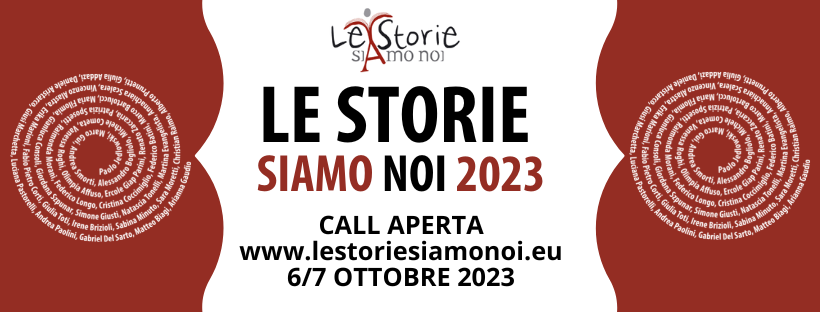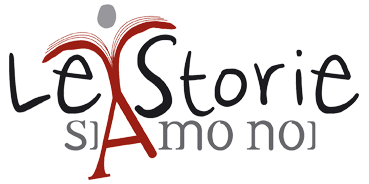Le Storie Siamo Noi 2023 – Call

Le Storie Siamo Noi
Costruire storie insieme
Lezioni, ricerche, cantieri di pratiche, narrazioni
9° Convegno biennale sull’orientamento narrativo
6/7 Ottobre 2023
CALL FOR CONTRIBUTIONS / INVITO A PRESENTARE RICERCHE E CANTIERI NARRATIVI
SCADENZA 15 MAGGIO 2023
Giunto alla nona edizione (la prima è del 2007), il convegno biennale ”Le storie siamo noi” è la prima iniziativa scientifica e divulgativa italiana dedicata interamente al rapporto tra scienze della narrazione e orientamento. Esperte ed esperti di varie discipline e lavoratrici e lavoratori della formazione, dell’istruzione, dell’orientamento e della comunicazione narrativa si incontrano per fare il punto sui recenti sviluppi teorici e applicativi dell’approccio narrativo nella ricerca e nelle pratiche educative e comunicative in senso lato.
Il convegno è organizzato da soggetti accreditati presso il MIUR come enti formatori e vale come formazione per gli insegnanti delle scuole di ogni ordine e grado.
Paolo Jedlowski definisce comunità narrativa “la comunità posta in essere dal fatto che fra certe persone, con una certa regolarità, circolano certi racconti e certe storie sono messe in comune”. Il concetto è affine a quello, utilizzato nell’ambito della psicologia delle organizzazioni, di comunità di pratiche, che Wenger definisce come “gruppi di persone che condividono un interesse per qualcosa che fanno e imparano a farlo meglio mentre interagiscono regolarmente”. Le comunità narrative, fondate o meno sulla condivisione di determinati scopi, si centrano, piuttosto, sul praticare, in modo collaborativo e con scambi reciproci, l’arte della narrazione nelle sue varie forme: orientamento narrativo, lettura silenziosa e ad alta voce, narrazione orale e ascolto degli stessi racconti, invenzione e condivisione di storie, visione di film, digital storytelling eccetera. Grazie alla condivisione di storie è possibile costruire comunità di pratiche narrative, in modo da contribuire alla creazione di legami di fiducia tra le persone, alla condivisione di significati e alla negoziazione di valori. In occasione del centenario della nascita di Bruno Ciari (1923-1970), uno tra i protagonisti del rinnovamento in senso democratico della scuola italiana, fautore del tempo pieno e di tecniche didattiche attive, cooperative e laboratoriali, e convinto assertore dell’idea che non si possa educare senza “dar vita a una comunità”, il convegno intende dare valore alla dimensione sociale e socievole delle pratiche narrative nei diversi contesti orientativi, educativi, assistenziali, di sviluppo e terapeutici. Particolare attenzione sarà dedicata al sistema pubblico di istruzione e alle istituzioni scolastiche, che proprio in questo periodo sono chiamate a individuare pratiche di orientamento formativo che consentano di applicare quanto previsto dalle Linee guida per l’orientamento (Decreto Ministeriale n. 328 del 22 dicembre 2022).
Sono ammessi al convegno e alla relativa pubblicazione due tipi di proposte:
–ricerche teoriche ed empiriche da presentare al convegno sotto forma di brevi relazioni orali o di poster;
–cantieri narrativi, ovvero laboratori che esemplificano una o più tecniche, strategie o metodi di lavoro, da realizzare nella sede del convegno.
Le ricerche verranno accettate attraverso una revisione “a doppio cieco” (double-blinded peer review) e saranno pubblicate integralmente nel Quaderno di lavoro, i poster saranno inseriti come abstract, mentre i cantieri narrativi selezionati dal comitato organizzatore saranno pubblicati sotto forma di breve testo descrittivo accompagnato da una breve bibliografia.
A titolo indicativo si riporta di seguito un elenco di argomenti attinenti al convegno:
-La costruzione di comunità di pratiche narrative
-Gli effetti degli approcci narrativi sull’empowerment di comunità e sociale
-La narrazione nel lavoro sociale, educativo, assistenziale, di sviluppo e terapeutico di gruppo
-Le strategie, le tecniche e i metodi di orientamento di gruppo con approccio narrativo
-L’orientamento narrativo nei diversi contesti e gli effetti delle pratiche di gruppo
-La lettura ad alta voce condivisa di storie
-La didattica orientativa e laboratoriale con le storie (lettura e scrittura letteraria, produzione di audiovisivi, ecc.)
Ogni contributo deve essere inviato entro il 15 maggio 2023 in forma completa all’indirizzo lestoriesiamonoi@gmail.com, e deve rispettare le seguenti caratteristiche:
PER LE RICERCHE Contributo in lingua italiana di massimo 25.000 caratteri spazi inclusi, preceduto da un abstract in italiano e in inglese di massimo 1000 caratteri. Il comitato organizzatore, sentiti i revisori, può decidere di ricollocare una ricerca nella sessione poster.
PER LA SESSIONE POSTER Contributo in lingua italiana di massimo 5000 caratteri – realizzazione del poster definitivo in formato fornito dall’organizzazione.
PER I CANTIERI NARRATIVI Contributo in lingua italiana di massimo 5.000 caratteri in cui deve essere descritto l’approccio usato nel laboratorio, le sue finalità, il target e il contesto a/in cui viene proposto abitualmente, i suoi principali riferimenti teorico metodologici e le eventuali evidenze e testimonianze dell’efficacia della proposta.
In caso di valutazione positiva delle proposte (che sarà comunicata entro il 30 luglio 2023), il comitato organizzatore si riserva di chiedere eventuali integrazioni e ulteriori materiali per la pubblicazione del Quaderno di lavoro (che sarà distribuito gratuitamente in occasione del convegno e pubblicato in formato digitale open access) e per la realizzazione delle due giornate convegnistiche.
Il canale you tube de “Le Storie Siamo Noi”
http://www.youtube.com/user/lestoriesiamonoi
Le Storie Siamo Noi
Building stories together
Lectures, research, work-in-progress, narratives
9°th Biennial Conference on Narrative Guidance
6/7 October 2023
CALL FOR CONTRIBUTIONS
DEADLINE: 15 MAY 2023
Heading into its ninth edition (the first was in 2007), the biennial conference “Le storie siamo noi” is the first Italian scientific and educational initiative entirely dedicated to the relationship between narrative science and guidance. Experts from various disciplines as well as training, education, guidance and narrative communication professionals, meet to take stock of recent theoretical developments and applications of the narrative approach in research and in educational and communicative practices in the broadest sense.
The conference is organised by entities accredited by MEM (Ministry of Education and Merit) as training providers and is valid as training for teachers in all types of schools and at all levels.
Paolo Jedlowski defines narrative community as “the community brought into being by the fact that among certain people, with a certain regularity, certain stories circulate and certain stories are shared”. The concept is similar to the one used within the field of organisational psychology, that is the communities of practice, which Wenger defines as “groups of people who share a concern or a passion for something they do and learn how to do it better as they interact regularly”.
The narrative communities, whether founded or not on the sharing of certain purposes, are rather focused on practicing, in a collaborative way and with reciprocal exchanges, the art of narrative in its various forms: narrative guidance, silent and aloud reading, oral and aural narratives, inventing and sharing stories, watching films, digital storytelling and so on. Therefore, by sharing stories, it is possible to build communities of narrative practices, in order to contribute to the creation of bonds of trust, the sharing of meanings, and the negotiation of values.
On the occasion of the centenary of the birth of Bruno Ciari (1923-1970), one of the leading figures in the democratic renewal of Italian schools, a proponent of full-time education and of active, cooperative and workshop teaching techniques, and a convinced advocate of the idea that education cannot be achieved without “giving life to a community”, the conference aims to enhance the social and sociable dimension of narrative practices in the various guidance, educational, care, development and therapeutic contexts. Particular attention will be paid to the public education system and to educational institutions, which at this very time are called upon to identify training guidance practices that enable them to apply the provisions of the Guideline for Guidance (Ministerial Decree no. 328 of 22 December 2022)..
Two types of proposals are eligible for the conference and its proceedings:
1) theoretical and empirical research to be delivered at the conference in the form of a short oral or poster presentation;
2) narrative work-in-progress practices, i.e. workshops exemplifying one or more techniques, strategies, or working methods, to be carried out at the conference.
The research papers will be accepted through a double-blind peer review process and will be published in their entirety in the Booklet, the posters will be included as abstracts, while the narrative work-in-progress, selected by the organising committee, will be published in the form of a short descriptive text followed by a brief bibliography.
The following, by way of example, are considered topics relevant to the conference:
– The construction of communities of narrative practices.
– The effects of narrative approaches on community and social empowerment.
– Narrative in social, educational, care, development, and therapeutic group work.
– Strategies, techniques, and methods of group guidance with narrative approaches.
– Narrative guidance in different contexts and the effects of group practices.
– Shared reading aloud of stories.
– Guidance and workshop teaching with stories (reading and writing, audiovisual production, etc.).
The contribution must be submitted by 15 May 2023, in full form, at lestoriesiamonoi@gmail.com, and must meet the following requirements:
– FOR THE RESEARCH PAPERS: Contribution in Italian of a maximum of 25,000 characters (including spaces), preceded by an abstract in Italian and English of no more than 1,000 characters. The organising committee, having heard the reviewers, may decide to relocate a research paper to the poster session.
– FOR THE POSTER SESSION: Contribution in Italian of a maximum of 5,000 characters – submission of the final poster in a format provided by the organisation.
– FOR THE NARRATIVE WORK-IN-PROGRESS: Contribution in Italian of a maximum of 5,000 characters including the description of the approach, the objectives, the target audience and the context to/in which it is usually proposed, main theoretical-methodological references, and any evidence and testimonials of the proposal’s effectiveness.
In case of a positive evaluation of the proposals (which will be communicated by 30 July 2023), the organising committee reserves the right to request any additions and further materials for the publication of the Booklet (which will be distributed for free at the conference and published in open access digital format) and for the organization of the two-day conference.
Il canale you tube de “Le Storie Siamo Noi”
http://www.youtube.com/user/lestoriesiamonoi

Restiamo in contatto